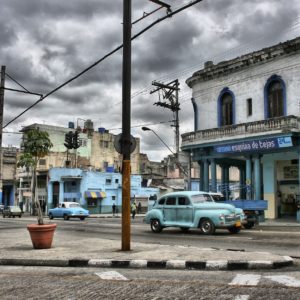Overview
Welcome to CUBA
Cuba is the largest Caribbean island, between the Caribbean Sea and the North Atlantic Ocean. It lies 145 km (90 miles) south of Key West, Florida, between the Cayman Islands and the Bahamas, to the west of Haiti, and northwest of Jamaica.
Capital Havana
Currency Cuban peso (CUP) / Cuban convertible peso (CUC)
Population 11.2 million (2013)
Electricity 110±0 volt / 60±0 hertz (Type A, Type B)
Country code +53
Time zone UTC−05:00
Emergencies 106 (police), 104 (emergency medical services), 105 (fire department)
Driving side Right
Understanding Cuba
Before the 1959 Revolution, Cuba was a popular tourist destination for United States citizens, mainly due to the large number of casinos catering to gamblers put up by the American mafia. Revolutionaries claim the Batista dictatorship was a government that neglected many of its own citizens’ health and welfare to maintain power. Many Americans had beach homes during the summer, and rich American companies owned large factories and land with the cooperation of Fulgencio Batista, the ruling military dictator. Since the Revolution, Cuba has been subjected to a trade and economic embargo (referred to in Cuba as el bloqueo, or the blockade) by the United States. Since 2009, US citizens with relatives living in Cuba have been allowed to visit the country.
After 1959 Cuban tourism was mostly for Cubans only, and the facilities were not renovated until the 1990s, when Cuba lost financial backing from the defunct Soviet Union and opened its doors to foreign tourism. Now many European, Canadian, and even American visitors come to the island. In the typical tourist regions like Varadero and Holguín many modern 3-star to 5-star hotels are available, while in less popular tourist regions visitors can still rent rooms in many Cuban homes (called casas particulares).
Due to several long-standing factors (e.g. bureaucratic ineffectiveness, the U.S. embargo, lack of resources, and the loss of Soviet subsidies), much of the country’s infrastructure is in need of repair. In major tourist destinations there will generally be few problems with either power or water, although outages may occur. Electricity outages have been common in Cuba, except in tourist facilities that have a generator. 2006 was designated the Year of the Energy Revolution in Cuba, and many small generators have been installed in an attempt to avoid blackouts. Since Venezuela began providing Cuba with cheap oil and the refinery in Cienfuegos was relaunched, the energy situation has improved. Many tourist accommodations offer 220V as well as 110V power sources. This is adequate for your power needs and should be enough to accommodate anything you plug in, at least to a reasonable limit.
History
Before Columbus landed on Cuba in 1492, the Taíno people had been living there for eons. In 1511, the first Spanish settlement was founded by Diego Velázquez de Cuéllar at Baracoa, and other towns soon followed including the future capital San Cristobal de Habana (Havana) which was founded in 1515.
Cuba remained a Spanish colony from 1511 to 1898 with an economy based on plantations, agriculture, mining and exports of sugar, coffee and tobacco to North America and Europe. The work was done primarily by African slaves brought to the island, until they were liberated in the late 19th century.
In 1898, Cuba was wrested from Spain by the United States in the Spanish–American War. The U.S. subsequently kept Cuba under military occupation as a protectorate for a few decades and then controlled it through a series of corrupt military dictators who were also friendly with the Mafia.
In the late 1950s, Fidel Castro led a Communist guerrilla army to victory over the regime of Fulgencio Batista. Following his victory, Cuba became a one-party Communist country aligned with the Soviet Union, and in a state of confrontation with the United States, which attempted to overthrow the Cuban government by proxy invasion, blockade, embargo, and several assassination attempts on Castro’s life by the Central Intelligence Agency. The only thing all these hostile actions succeeded in doing was helping to cripple Cuba’s economy. Nevertheless, literacy and health care improved greatly under Fidel’s rule. In more recent years, Venezuela under the rule of Hugo Chávez provided free oil to Cuba in exchange for Cuban doctors and nurses.
There is a large gap between the income of visitors to Cuba and what local workers can earn. In recent years, since Fidel Castro retired, his brother, Raúl, has introduced more market-based reforms. However, the country remains a Communist state, public criticism of the government or Communist Party is strongly discouraged.
Culture
Cuban music is influenced by the melding of African and Cuban cultures that is also expressed in the traditional belief in Santería, the local name for Yoruba religion and practices that originate from Nigeria. As in other Caribbean lands, traditional Afro-Caribbean religious and ritual practices are anathema to some, yet are believed to a greater or lesser degree by many Cubans. Most Cubans who profess a religion identify as Christian, especially Roman Catholic, even though some of the Christians also believe to some degree in Santería. The ruling Communist Party is not aggressively atheist, and amended the Cuban Constitution in 1992 to make Cuba no longer officially atheistic.
Cuba’s food is also a product of the melding of the cuisine of the Taíno natives, the Spanish conquistadores, the Africans who arrived as slaves, and immigrants from various parts of the world including China.
People
Although average income is only US$ 15 Cubans are not technically ‘poor’ as their basic needs are covered by the government. They pay their monthly bills of subsidised electricity and water with around US$ 5, receive free education from elementary school to university, can see doctors for free and receive medicine for free. The social system cares for people out of job and provides them with a home and money for food. Life is not easy but everyone can survive. Keep this in mind when it comes to tipping or people begging in the streets (rare). Some might even approach you asking for shampoo and soap because they were told that tourists leave those products behind when going back home. Remember that all your actions might be projected onto tourists in general.
A list of contributors (and more information) is available at the original article on Wikivoyage.
Flickr Image credit: Bruno

 Cuba
Cuba 

Post New Review